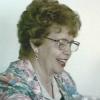
Wilma Williams spoke on April 27, 1996 at the Land's End Resort in Homer, Alaska for a Communities of Memory meeting where people told stories about life in Homer. In this recording, Wilma talks about the business she and her husband had building subdivisions in Homer and her family.
Digital Asset Information
Project: Homer Communities of Memory
Date of Interview: Apr 27, 1996
Narrator(s): Wilma Williams
After clicking play, click on a section to navigate the audio or video clip.
Sections
Coming to Homer
Family
World War II memories
Living in a wanigan with her husband
Husband's employment
Fishing in Bristol Bay
Click play, then use Sections or Transcript to navigate the interview.
After clicking play, click a section of the transcript to navigate the audio or video clip.
Transcript
WILMA WILLIAMS: We came up -- we were actually going to Fairbanks, but my dad got to talking to people -- on the boat, and Fairbanks had kind of quieted down and they convinced him that he should probably come to Cook Inlet.
So we ended up in Seldovia.
And that was in the mid '20s and work in the States was not very plentiful.
Daddy went to work right away, peeling trap pulls for Merrill Hennington and when it was winter -- when it was fall, he ended up cooking at the jail over there.
And he always said he was the only one that was in jail, because they -- everybody else could go out during the day, they were just supposed to show back up and there certainly wasn't much place for them to go.
And, then I lost my mother and I was with my grandmother and grandfather for years, but when I got to be a teen-ager, my grandma decided it was time for us to come and be with our dad.
She was one of the lucky ones that had a place you could send a teen-ager.
And so I came back here in 1941, my sister and I.
And -- I guess Thelma is the only one, Thelma and Harris are the only ones that were here at that time in this group -- and so I got to see the rest of 'em arrive.
Diane's memories of the war are different than mine, because I was three years older and the soldiers that went through looked a lot better to me than they did to her.
I was going to school here at the time, and Anchorage opened up, wide open.
And there was a lot of work there. And it seemed to me that sitting in school was a total waste of time when there was work and you could make money.
So -- and the horrible construction guys and soldiers that she talked about tip really well, so I went to Anchorage and went to work.
And in the course of time I got married, and we -- my husband worked on the road as it was built out of Homer.
And we had a wanigan and lived out there in the summertime.
When we first moved out on the road, we stayed in an army tent.
And I came to the conclusion that army tents are designed that way with the hole in the top so that they can make the guys so uncomfortable that they feel like fighting, and it affected me exactly the same way.
So we built the wanigan.
And while we were building that wanigan, the tent had the tie-downs on the side and our bed was right up against the wall of the tent.
And at night a black bear came and rubbed his back on the lines and the next day I was very enthusiastic about finishing that building so there was a little more between me and the bear.
And after the road was built, everybody had to have clearings on their homesteads, so it made a lot of cat work that was needed.
And Red Ballentine, who had worked on the road, had a D-6 and he got killed and his sister tried, with her husband, to handle the business, but they weren't familiar with the equipment and the mechanical parts and everything.
And we ended up buying that, and did a lot of the road work and on the subdivisions for Harry and for others around.
And we did a lot of the clearing.
And I got so I could do the cost estimating and the bookkeeping, and raising the kids and doing the cooking, and running to the bank, and all of the things you do in small businesses.
And later on we went -- after we were separated, I ended up at Bristol Bay and fishing with my kids over there.
And I have written these things in -- it's coming out in two books.
And the first one is actually the last part, where I was at Bristol Bay, and that's called "This is Coffee Point: Go head," like I answered the radio over there.
And the other one is called "If You've Got It To Do." And I think we all know about if you've got it to do what happens.
And that's about the early days in Homer. Thank you.

